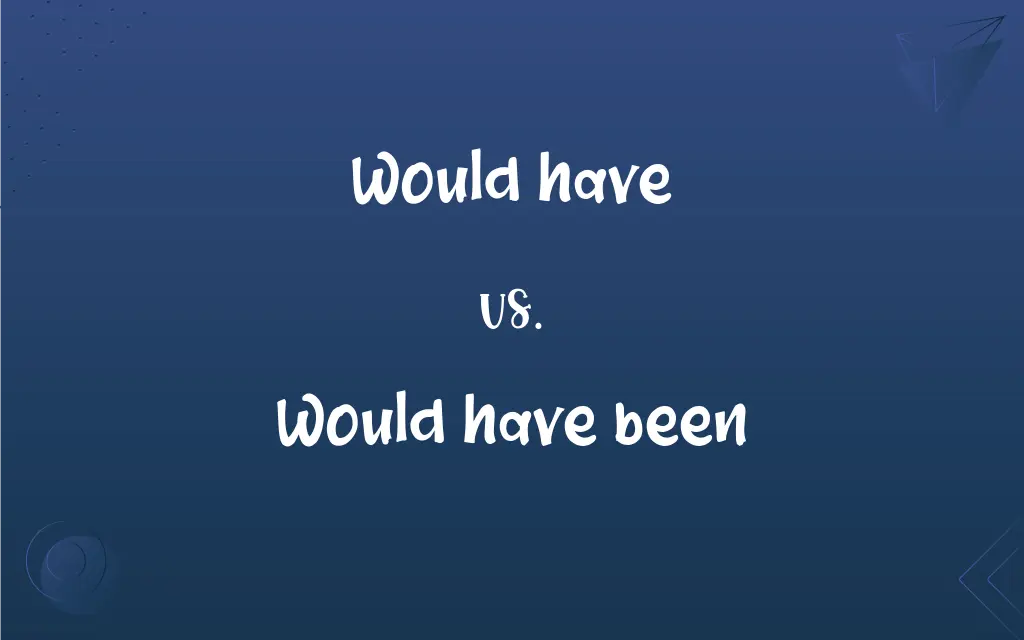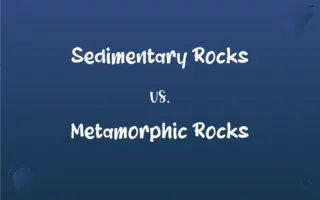Would have vs. Would have been: What's the Difference?
Edited by Aimie Carlson || By Janet White || Published on July 12, 2024
"Would have" indicates a hypothetical past action or event, while "would have been" refers to a hypothetical past state or condition.

Key Differences
"Would have" is used to express a hypothetical action that could have occurred in the past but did not. "Would have been," on the other hand, focuses on a hypothetical state or condition in the past. Both phrases imply that the action or state did not actually happen.
When using "would have," it often follows with a verb, suggesting an action or decision. In contrast, "would have been" is followed by an adjective, noun, or prepositional phrase, indicating a state of being or circumstance. Both constructs are used to speculate about past situations.
"Would have" is typically used in conditional sentences to express the result of a condition that was not met. "Would have been" is used similarly, but it emphasizes the resultant state rather than the action. Both are used in the third conditional structure.
In usage, "would have" implies a missed opportunity or alternative outcome. "Would have been" often conveys a sense of reflection or regret about a past condition or situation. Both forms are reflective and hypothetical in nature.
Examples of "would have" often include verbs of action, like "would have gone" or "would have said." Examples of "would have been" involve descriptions, such as "would have been better" or "would have been easier." Both forms help in expressing conjectures about the past.
ADVERTISEMENT
Comparison Chart
Type of Construction
Action-oriented
State or condition-oriented
Common Usage
In conditional sentences as a hypothetical past action
In conditional sentences as a hypothetical past state
Typical Follow-up
Followed by a verb
Followed by an adjective, noun, or prepositional phrase
Implication
Indicates a missed action or alternative outcome
Suggests a possible past state or condition
Emotional Connotation
Often implies regret or reflection over actions not taken
Usually reflects on situations or states that could have been
ADVERTISEMENT
Would have and Would have been Definitions
Would have
Missed opportunity or alternative action.
She would have won the game, had she practiced more.
Would have been
Speculative past outcome.
The party would have been fun, but I couldn’t attend.
Would have
Speculative past decision.
They would have bought the house, but it was too expensive.
Would have been
Reflective past possibility regarding a state.
The weather would have been perfect for a hike yesterday.
Would have
Conditional past action.
He would have called you if he had your number.
Would have been
Implied regret over a past circumstance.
They would have been happier in a different school.
Would have
Hypothetical past action.
I would have traveled if I had the money.
Would have been
Hypothetical past state or condition.
It would have been easier with your help.
Would have
Reflective past possibility.
We would have been there on time if we hadn't gotten lost.
Would have been
Conditional past situation.
You would have been tired if you had worked all night.
FAQs
Is "would have been" only used for negative situations?
No, it can be used for both positive and negative hypothetical situations.
Can "would have" express regret?
Yes, it often expresses regret about a past action not taken.
Can "would have been" be used in a positive context?
Yes, it can express positive hypothetical states, like "would have been wonderful."
When should I use "would have"?
Use it to talk about a hypothetical situation in the past.
What does "would have been" imply?
It implies a hypothetical past state or condition.
How do I form a sentence with "would have"?
Combine it with a past participle verb, like "would have gone."
Can "would have" be used in questions?
Yes, in speculative questions about the past.
Is "would have been" appropriate for current situations?
No, it refers to past hypothetical states.
Is "would have" used in conditional sentences?
Yes, especially in third conditional sentences.
Does "would have been" require a specific verb tense?
It is usually followed by an adjective, noun, or prepositional phrase, not a tense.
What's the difference between "would have been" and "could have been"?
"Would have been" implies a choice, while "could have been" implies possibility.
Is it correct to use "would have been" in questions?
Yes, for asking about hypothetical past states.
Can "would have" be used without a following verb?
No, it needs to be followed by a past participle verb.
How do I choose between "would have" and "would have been"?
Use "would have" for actions, "would have been" for states or conditions.
Can "would have" be used for actions in the present?
No, it's strictly for hypothetical past actions.
What mood does "would have" convey?
It conveys a subjunctive or hypothetical mood.
Is it necessary to use an adjective after "would have been"?
An adjective, noun, or prepositional phrase is typically used after it.
Does "would have been" always suggest regret?
Not always, but it often conveys a sense of reflection on what could have been.
Can "would have been" imply a positive missed opportunity?
Yes, it can reflect on positive situations that did not occur.
How does "would have" differ from "could have"?
"Would have" is more about choice, while "could have" is about possibility.
About Author
Written by
Janet WhiteJanet White has been an esteemed writer and blogger for Difference Wiki. Holding a Master's degree in Science and Medical Journalism from the prestigious Boston University, she has consistently demonstrated her expertise and passion for her field. When she's not immersed in her work, Janet relishes her time exercising, delving into a good book, and cherishing moments with friends and family.
Edited by
Aimie CarlsonAimie Carlson, holding a master's degree in English literature, is a fervent English language enthusiast. She lends her writing talents to Difference Wiki, a prominent website that specializes in comparisons, offering readers insightful analyses that both captivate and inform.






































































